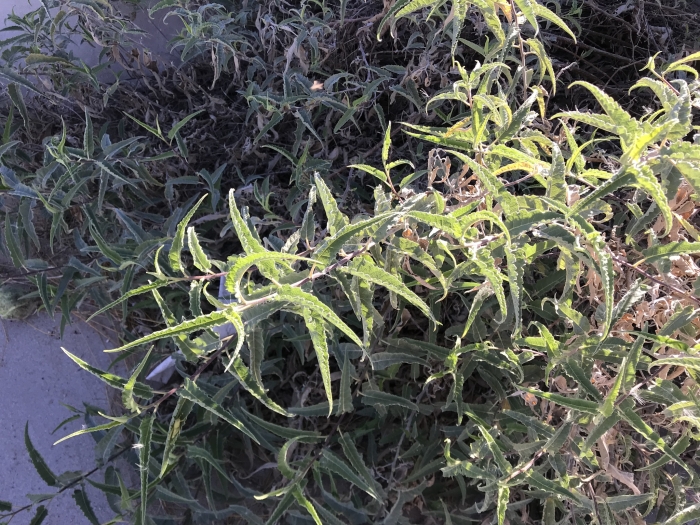Canyon Ragweed
(Ambrosia ambrosioides)
Canyon Ragweed (Ambrosia ambrosioides)
/
/

CK Kelly
CC BY 4.0
Image By:
CK Kelly
Recorded By:
Copyright:
CC BY 4.0
Copyright Notice:
Photo by: CK Kelly | License Type: CC BY 4.0 | License URL: http://creativecommons.org/licenses/by/4.0/ | Rights Holder: CK Kelly | Publisher: iNaturalist | Date Created: 2017-12-13T16:44:52Z |















































Estimated Native Range
Summary
Ambrosia ambrosioides, commonly known as Canyon Ragweed, is a semi-deciduous shrub or subshrub native to arid desert regions and scrublands of the Southwestern USA and Northwest Mexico. It typically grows to a height of 1–2 meters and is characterized by its elongate, coarsely-toothed leaves that are 4–18 cm long and 1.5–4 cm wide. The plant is monoecious, with both male and female flowers on the same plant; the male (staminate) flowers are arranged in terminal and axillary racemes above the female (pistillate) counterparts. Flowering mainly occurs from February through April, and the plant produces 10–15 mm burs covered with hooked spines that facilitate seed dispersal by attaching to animals and clothing.
Canyon Ragweed is valued for its adaptability to various light conditions, including full sun, part shade, and full shade, making it versatile for different garden settings. It requires medium amounts of water and thrives in soils with medium to fast drainage. While not commonly used in ornamental horticulture due to its allergenic pollen, it can be used in naturalistic plantings and restoration projects in its native range. Gardeners should be aware that it can cause allergic reactions in sensitive individuals and may become weedy or invasive in some areas.CC BY-SA 4.0
Canyon Ragweed is valued for its adaptability to various light conditions, including full sun, part shade, and full shade, making it versatile for different garden settings. It requires medium amounts of water and thrives in soils with medium to fast drainage. While not commonly used in ornamental horticulture due to its allergenic pollen, it can be used in naturalistic plantings and restoration projects in its native range. Gardeners should be aware that it can cause allergic reactions in sensitive individuals and may become weedy or invasive in some areas.CC BY-SA 4.0
Plant Description
- Plant Type: Shrub, Subshrub
- Height: 4-6 feet
- Width: 3-4 feet
- Growth Rate: Moderate
- Flower Color: N/A
- Flowering Season: Spring, Summer
- Leaf Retention: Semi-Deciduous
Growth Requirements
- Sun: Full Sun, Part Shade, Full Shade
- Water: Medium
- Drainage: Medium, Fast
Common Uses
Bird Garden, Erosion Control, Low Maintenance
Natural Habitat
Arid desert regions and scrublands of the Southwestern USA and Northwest Mexico
Other Names
Common Names: Ambrosia Leaf Bur Ragweed, Ambrosia Bursage, Ambrosia Leaf Burr Ragweed, Big Bursage, Chicura
Scientific Names: , Ambrosia ambrosioides, Franseria ambrosioides, Ambrosia ambrosioides subsp. ambrosioides, Ambrosia ambrosioides subsp. septentrionale, Ambrosia longifolia, Gaertneria ambrosiodes, Gaertneria ambrosioides, Xanthidium ambrosioides,
GBIF Accepted Name: Ambrosia ambrosioides (Cav.) Payne